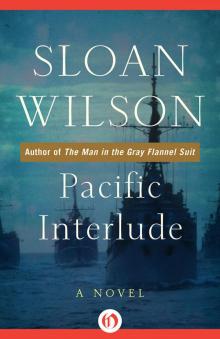- Home
- Sloan Wilson
Pacific Interlude Page 9
Pacific Interlude Read online
Page 9
He slept late. When he awoke, sunlight was streaming through the window, glinting on the brass bed. Angel, wearing only a towel pinned kiltlike around her waist, was cooking bacon on the gas ring. He had a hangover, but the fragrance of the bacon and coffee was a good antidote.
“I see I’m still in heaven,” he said. He sat up and rubbed his eyes.
“I hope I didn’t wake you up. I have to run to work.”
“What time is it?”
“Almost eight-thirty. You can stay as long as you want. Joanie won’t be back until tonight.”
“What time will you be back?”
“I’m afraid I won’t be able to see you tonight,” she said casually. “My regular chap is coming back this afternoon.”
He felt stunned.
“When can I see you again?”
“It wouldn’t be right for me to run off and see you when he was here. I don’t know when he’ll go away again.”
Her damn moral distinctions baffled him and angered him. Even though he had no right and he knew it.
“Won’t we see each other again?”
“Maybe not for a month or so and maybe you won’t be here then. You can’t expect me to leave my regular chap, can you? It wouldn’t be right.”
“No, hell no. Wouldn’t be right.”
“I can easily introduce you to some girls, if you like. I think you’d definitely go for Martha and I know she’d be crazy about you. Joanie would like you too and she may be leaving her regular chap—”
“I think you’ve spoiled me for anybody else,” he said, and at the moment he meant it.
“You’ve kind of spoiled me too, but I can’t let that happen. Girls who let married Yanks turn their heads are just daft.”
She glanced at the clock on the wall.
“We have just time for a quick one if you want before I have to run.”
“I suppose I should say no, but I guess you’ve talked me into it.”
She came to him then and their lovemaking was so intense that he was afraid he was hurting her, but in its fashion her wonderfully muscular little body was almost stronger than his.
“God, I don’t even have time for a shower,” she said, suddenly jumping up.
She toweled herself, put on a subdued blue secretary’s dress which almost succeeded in concealing her figure, ran a comb through her hair, gave him a kiss and ran through the door.
“Just shut it hard when you leave,” she called. “It’s a spring lock.”
“It’s a spring lock”—famous last lovers’ words. Well, there was nothing now but to get dressed and go back to the Y-18, Simpson and Buller. Never mind, he was certain that he would be grateful to this Angel for a very long time.
CHAPTER 7
SYL GOT BACK to his ship a little after nine that morning. If Angel’s room was heaven, the Y-18 was hell, especially for a man suffering from a hangover. With workmen cutting, welding, chipping and sandblasting all over her steel hull, he felt like a mouse in a huge tin drum which was being beaten on both sides.
As soon as he stepped from the ladder to her rusty decks crisscrossed with hoses and lines, a workman with a welder’s mask shoved to the top of his head approached. “You the captain here?”
“Yes.”
“The superintendent wants to see you in his office right away.”
The peremptory tone told him something was up and he went to his cabin to ask Simpson what was going on. His sour-looking executive officer was at the desk, going through a pile of work orders. He was obviously in a rage.
“Captain, we’ve got to do something. The yard is goofing off, our men are goofing off, and we have to take a stand—”
“What’s the matter with the yard?”
“Shoddy work. These welders leave seams like mud hills. I’ll show you—”
“In a minute. What’s wrong with our crew?”
“They’re not here. Liberty was up at eight this morning, but not even Mr. Wydanski and Mr. Buller showed up.”
“There’s not much work they can do under these conditions anyway.”
“The hell there isn’t. They can work on the engine and paint out the forecastle. Even the duty section that stayed last night is giving me a hard time.”
“How?”
“They’re smoking all over the ship, ignoring my orders. I know the tanks are steamed out, but you have to build up good habits. No smoking aboard this ship period, except on the fantail. No exceptions ever.”
“I’m not sure you’re right about that—”
“How can you say that? I know tankers. I know men—”
“If they think we’re just trying to enforce a lot of chickenshit regulations without any common sense, the only habit you’re going to build will be breaking the rules. They know that when the tanks are steamed out, rules against smoking are obviously foolish. We’ll lose credibility—”
“Captain, if you start countermanding my orders, you’ll have to run this ship alone.”
“No, I’ll just get an executive officer who will follow my policies and find out what they are before issuing his orders.”
Simpson’s face flushed.
“Are you going to tell the men they can smoke because my orders don’t mean anything?”
“I’ll go with you this time. Later you can tell the men we’ve thought it over and decided to change the policy. Let it lie for a few days. And as for the men and officers not showing up in the morning, they had a big party last night. Now they’ve blown off steam, we’ll tell them they have to keep in line. Anything else?”
“I have a list of supplies a mile long. Mr. Buller should be trying to get them right now.”
“I’ll have a talk with him as soon as he gets aboard. Mr. Simpson, how long has it been since you’ve taken a day off?”
“How can I worry about that when there’s so much to be done?”
“Now that the yard work is going fast, we’ll get the pieces put together. Meanwhile we all have to try to keep our sanity.”
“Sir, God helps me to keep my sanity. I mean that. I don’t have to go ashore, get drunk and run around with whores to do it.”
Syl wanted to murder him on the spot. “I wasn’t suggesting that. There are some … nice cathedrals you could visit. Hell, Mr. Simpson, everybody has to get away from the ship once in a while. All right, now let’s take a look at the welding. The superintendent says he wants to see me.”
The welding seemed rough but strong. Simpson disagreed.
“Captain, we’ve got to tell headquarters to stop payments on this,” Simpson said, running his hand over the bulging seams. “The government shouldn’t pay for a botch like this.”
“I’ll see what the superintendent has to say.”
The superintendent did not seem inclined to be cooperative. “Young man, if you expect to be captain of a ship you have to learn procedures in a shipyard,” he began with an upper-class British accent.
“What is your name, sir?” Syl asked, making a point of keeping his voice so low and polite that it was a kind of insult.
“Higgins, Ralph Higgins. What’s yours?”
“Sylvester G. Grant, lieutenant, United States Coast Guard Reserve, commanding officer of the U.S. Army tanker, Y-18. One of your workmen said that you want to see me. If you want to explain Australian yard procedures to me, I’ll be happy to listen and explain the American system. But if you want to lean on me—”
“Yard procedures are international. The officers of a ship should keep the hell away from yard workmen. If they have complaints, they should go to their captain and he should go to the superintendent. What I am trying to say is, keep that little bastard Simpson off the backs of my men. They can’t work with him looking over their shoulder and yelling at them.”
Syl smiled.
“Thank you for making that all perfectly clear. Shall we now talk about bad welding?”
“I’ve inspected that job myself and I find it is adequate for the purpose. We were not told to re
finish a yacht, but to rush a tanker back into operation.”
“She’s still an army ship and the United States government is not used to operating vessels that look like they’ve been put together like a patchwork quilt. Tell your men to shape up. I don’t have time to argue with you. When the work is done, I’ll inspect it and send a report to my headquarters. Meanwhile, don’t send me messages to come see you here. Our custom is for the yard superintendent to see the captain aboard his vessel.”
Syl had no idea whether this was true, but his anger and frustration needed some outlet. When he returned to his cabin he tactfully as possible told Simpson to stay away from the yard workmen. The executive officer’s thin face flushed again, and his pale blue eyes flashed anger through his steel-framed spectacles. “Aye, aye, sir. Anything you say, sir.”
So far this day Syl had a perfect score of making all human relations worse. A chipping hammer seemed to be aimed directly into his right ear. He wanted to go ashore and forget the Y-18, but the problem of the officers and men coming aboard whenever they damned well pleased had to be handled.
The lack of a private cabin for the ship’s captain was a real problem—even the smallest Coast Guard cutters provided that. Simpson continued to shuffle papers on the desk. There was no solitude aboard this ship. How long would he have to put up with this … One year? Two? He could go crazy.
In a sense he realized that the question itself was optimistic—assuming as it did that the ship would survive that long. The thought of a quick death flashed into Syl’s mind, and was met by a flash-memory of Angel with only a towel draped around her waist. He had succeeded in not thinking about her for almost an hour, and the realization that he would not see her again made him feel sick to his stomach. He lay down on his bunk, turned his face away from Simpson and closed his eyes. Calm down … what had last night meant anyway? There was no point in being so damned worked up about it. He’d met a good-looking girl who was good in bed. What would have happened if she had not gone back to her “regular chap”? How long would all that excitement and exhilaration have lasted?
Nevermind, he wished like hell he had had a chance to find out. When Simpson went on deck, Syl sat down at the desk and began to look for his checklist. He found it under a blotter on the desk. But while rifling through a drawer for a pen he discovered a snapshot under the wrinkled shelf paper which covered its bottom. It was a picture of a smiling, middle-aged woman sitting up nude in a bed, her groin covered by a sheet, her ample breasts uplifted as she leaned back on a pillow, her hands folded behind her head. Somebody’s wife or somebody’s girl …Could it be Simpson’s? More likely it had belonged to Carlson, the skipper who had been killed. This sweet face, which looked so anxious to please, did not resemble the sour countenance in the photograph of Simpson’s wife over his bunk. Turning the snapshot over, Syl read the words, “Forget-me-not.”
While he was turning that one over Simpson returned.
“Do you know anything about this?” Syl said.
Simpson peered at the photo and quickly glanced away.
“It’s sure not mine.”
Syl carried the snapshot to the sink, where he touched a match to it and held it by a corner, thinking of the blaze which had consumed the woman’s husband or lover. Maybe this was the appropriate finishing touch.
His head still ached from the night before and he felt a little dizzy, as though his hangover was getting worse. Lying down in his bunk, he fell into a deep sleep. It had to be. To keep out the surrounding din.
He was awakened more than two hours later by the arrival of Buller, who looked bleary-eyed but sounded jovial as ever. He was wearing his white cowboy hat on the back of his head. Striding into the cabin without knocking, he approached Simpson, who was working at the desk. “Good morning, Simp!” he said, “You missed one hell of a good party last night—”
“Don’t call me ‘Simp.’ I worked twenty years for a commission and the right to be called Mister.”
“Sorry about that, Mister. I just thought it was time for us all to get a little friendly around here.”
Syl rolled from his bunk and sat on the edge of it, rubbing his face.
“Mr. Simpson,” he said, “maybe you better go and let me have a little talk with Mr. Buller.”
“Glad to,” Simpson said.
“Where in hell did you go last night, skipper?” Buller said when Simpson had gone.
“I met a lady who took me on a drive around the city.”
“You should have stuck around. The party just got rolling around ten o’clock. A lot of new broads came in. I think even old Wydanski got laid.”
“Good for him,” Syl said. The thought of the venerable white-haired engineer with a girl somehow reassured him.
“If he didn’t, it was his own fault. Somewhere around two in the morning he went off somewhere with a nice little nurse. Has he showed up here since?”
“I haven’t seen him. Have the rest of the men come back to the ship yet?”
“I brought them back in the truck. They’re holding their heads but happy all the way.”
“Good. There’s work to do here. The interior painting and engine work are up to us. We’re going to have to make sure that all officers and men report aboard before eight o’clock every morning.”
“That’s okay with me, but if you want me to get all those supplies on the list, I’m going to have to run around town a lot.”
“Nonetheless, you and everyone else, including me, check in here every morning before eight. And one more thing. Some customs that may seem silly as shit to you were devised to let men live in close quarters aboard small ships for long periods of time. A few formalities have to be observed. Call an officer Mister with his last name, deep six nicknames. Enlisted men are called by their last names.”
“Why can’t we just act natural—?”
“There’s nothing natural about life aboard a ship. You’ve seen that. The rules were designed to help men to get on with one another.”
“It all sounds like bullshit to me, but I’ll try if you want.”
“I want. And while we’re on the subject, please don’t wear that hat aboard ship. We ask the enlisted men to stay in uniform, like it or not, the officers have to set an example—”
“Skipper, this ain’t a battleship. Why not let all the men wear whatever kind of hat they want? A little individuality would be good for morale—”
“Let’s forget it, Mr. Buller. Stow the damn hat. And I suggest you check with Mr. Simpson to see what supplies we need first.”
“Aye, aye, sir,” Buller said, jumping to his feet. “I say that right?”
Syl ignored him. He wanted a cup of coffee. The galley range must be in operation now that the tanks had been steamed. He went to the wardroom and found Wydanski hunched over a mug, pale, tired but clear eyed.
“Good morning, Mr. Wydanski.” Syl reached for a mug on a shelf.
“I guess it’s afternoon, isn’t it, skipper?” Wydanski said, sounding out of it.
“Just about. How’s the work in the engine room coming?”
“There’s not a hell of a lot we can do except wait for spare parts. The boys are cleaning it up, fixing what they can.”
“Now we’ve all had a chance to blow off steam, I think we’re all going to have to start getting aboard before eight in the morning.”
“Yes, sir. How long do you think we’ll be in Brisbane?”
“It’s hard to tell. Not as long as I first thought. The yard is working around the clock.”
“Do you think we’ll have two weeks more?”
“Maybe about that.”
“Is there any way I can get my pay here? I have two months of it coming to me. My records got all fouled up.”
“There’s a problem—there’s no pay office for us here. We have a big ship’s welfare fund now, though, and I’m going to authorize paying from that.”
“I’d be grateful, sir. I’m getting pretty low.”
“Mr
. Buller is in charge of the welfare fund. See him about it.”
“Skipper, I want to thank you for getting that house, the welfare fund, everything. This is a pretty awful little ship, but you’re keeping the morale of the men high.”
“The house was Mr. Buller’s idea.”
“It was a good one, skipper. Brisbane’s a great town.”
He was lucky, Syl thought. Apparently his girl hadn’t yet gone back to her regular chap.
Buller had succeeded in bringing fresh food to the ship. Lunch that day included hamburgers and ice cream, almost forgotten delights. Afterward the men began sanding down the interior bulkheads in the officers’ staterooms and in the forecastle. The dust and noise added to the din of men hammering on the outside of the hull were almost intolerable.
At five that afternoon Buller said, “The cook’s going to get meals aboard for the duty section, but I’ve got plenty of girls to cook for us at the house. Do you want to join us for dinner?”
What the hell, Syl thought, it beat wandering the streets or touring the bars again. He went back to the house with Buller for dinner with the men, and it looked as though the party of the night before had never stopped. The laughter of the young women who sat around drinking and eating, before paying off with a few minutes on the soiled mattresses scattered through the rooms, grated on his nerves.
He could not snap out of it. As he sat at the long dinner table, watching the men jostle for position near the best-looking girls and downing the strong, dark Australian beer, he began to suspect that he had been wrong in letting Buller rent this house. Buller and Cramer, the two most aggressive roosters, were already glaring at each other as they competed for the attention of a plump brunette. If rank was forgotten and the men ended up fighting with each other in drunken brawls here, how could order be established when they moved back to the ship?
It was too late to undo his mistake. If he found some military barracks to house the men while the ship was on the ways, Buller, Cramer and even Wydanski would never forgive him, though he suspected that some of the younger seamen who congregated rather shyly near the kitchen might be relieved. They wouldn’t have to compete. Anyway, whatever he did now, it was likely the crew of the Y-18 would be seething with all sorts of angers and resentments before they ever left the wharf.

 A Summer Place
A Summer Place Pacific Interlude
Pacific Interlude Man in the Gray Flannel Suit
Man in the Gray Flannel Suit Ice Brothers
Ice Brothers